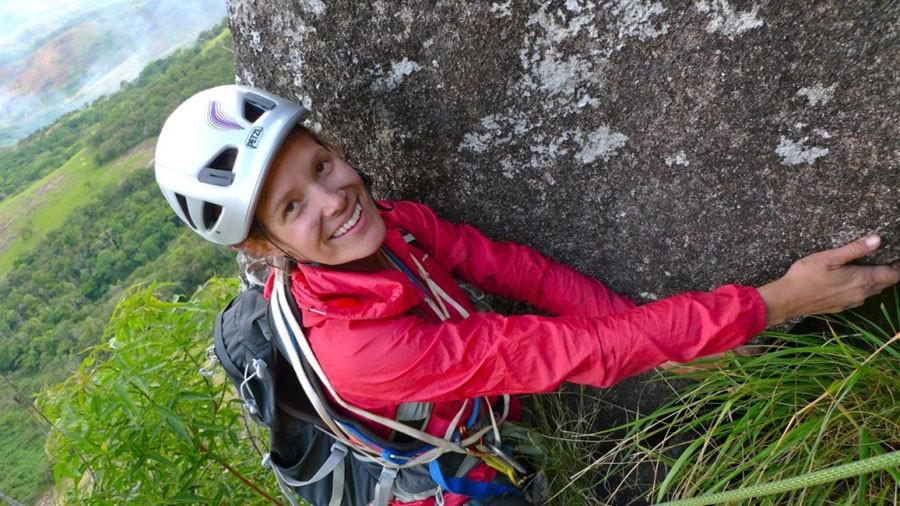Renowned rock climber speaks at JSC
Brad Moskowitz, an outdoor education professor at Johnson State College, proudly announced, on March 5, Creative Audience guest speaker: Majka Burhardt, a professional climber, published author, film-maker, and expectant mother of twins.
A very pregnant Burhardt stepped up to the podium to begin telling her complex story. She has spoken on a number of different platforms such as TED Talks, Good Life Project, and at multiple college campuses, including Harvard Medical School. Her topics range from “leadership when it matters” to “triumph in uncharted territory,” and so on, all with the same message: passion, purpose, and pursuit.
After a quick introduction, she began to speak about how she started out in the climbing world. “I grew up in small-town Minnesota and first climbed at a very young age. I think there was some incentive, like chocolate,” Burhardt said. “In high school, I made them put a not-so-glamorous photo of me in the senior yearbook with my fleece parka and hiking boots on.”
As a professional climber, she is sponsored by many businesses such as Clif Bar and Patagonia. Patagonia ended up being a huge aid in her obsession with climbing and learning in Mozambique, Africa.
“As a climber, I always have really weird photos sent to me of mountains that people proclaim I must climb,” Burhardt said. “One day, I was sent a very blurry and bad photo, taken from a train, of Mount Namuli, Mozambique’s second highest mountain.”
Burhardt previously climbed in Ethiopia and wrote a best-selling non-fiction book called “Coffee Story: Ethiopia” in 2011. The drive to explore a new place, especially one that had not been climbed before, was intense.
“The process to get a team to go to Africa was hard. But I’ve never been one to take no for an answer, and I’m a complicated person,” Burhardt said. “There were three essential questions to ask about Mount Namuli: Was the mountain accessible and able to be climbed? Was there research to be discovered on this mountain? And lastly, how did the locals feel about us being there?”
Burhardt, a lover of science, felt it was absolutely necessary to include scientists in this project. She was going to have to dig a trail on the side of the mountain in order to be able to climb, and knew it would ruin natural habitats that had been there for thousands of years.
“Eventually we got a team together of a couple climbers and scientists from America as well as Africa,” said Burhardt. “We also got sponsorship from Patagonia.”
When she pointed to the large projector to her left, “Namuli: The Film” started playing. Quirky, up-beat music paired well with images of locals and the crew racing up trails in small motorcycles. With this imagery, and another introduction, the film began. A quaint yellow home in Minnesota and a poodle with an elaborate name showed off Burhardt’s roots. The film then showed the group traveling to Africa and setting up camp on the bottom of Namuli.
“Us climbers had to show the scientists how to climb up the side of the mountain. We set the ropes, started climbing first and then had them follow us up from behind,” said Burhardt.
“What happens when a team of rock climbers, biologists, and conservationists set off on an unconventional expedition into one of the world’s least-explored and most-threatened habitats?” her film-card read. Well, the team discovered a new species of amphibian on the last day of the trip, which fueled the biological need to explore Namuli.
The movie highlighted a specific local named Edwin, who plants trees and works to conserve local nature. Mozambique locals fear that global climate change will impact the environment and that the younger generation will not be alive to see a lush Africa.
The film was featured at international film festivals and shown on NBC’s Universal Sports. Burhardt was nominated for an EPIC Emerging Artist Award for her work as the executive producer, among other honors for this film. The response gave birth to her NGO, Legado, stemming from the word “legacy.”
“The goal of Legado is to establish legacy-driven community conservation projects that protect biodiversity, make measureable human livelihood gains, and empowers many to flourish. What will be left for our children?” said Burhardt passionately.
Legado was born in 2015 and has had one successful summer expedition with young adult “fellows” who came from New Hampshire to Minnesota. Each fellow was responsible for raising enough money so one African student could attend as well. This initiative is working in tandem with LUPA, a Mozambique NGO that is centered on African conservation, to establish community areas and collect more data.
“Namuli” can be viewed on the website majkaburdhardt.com, as well as various talks Burdhardt has given. Legado, with its expanding enterprise, has its own website: legadoinitiative.org.





Ishani • Mar 25, 2016 at 3:06 pm
Inspirational. I am looking to be professional climber here in India.